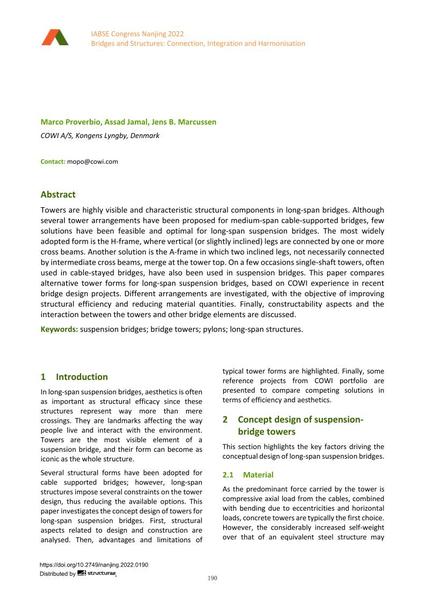Conceptual Design of Long-Span Suspension Bridges: Tower Structural Forms

|
|
|||||||||||
Bibliographic Details
| Author(s): |
Marco Proverbio
(COWI A/S, Kongens Lyngby, Denmark)
Assad Jamal (COWI A/S, Kongens Lyngby, Denmark) Jens B. Marcussen (COWI A/S, Kongens Lyngby, Denmark) |
||||
|---|---|---|---|---|---|
| Medium: | conference paper | ||||
| Language(s): | English | ||||
| Conference: | IABSE Congress: Bridges and Structures: Connection, Integration and Harmonisation, Nanjing, People's Republic of China, 21-23 September 2022 | ||||
| Published in: | IABSE Congress Nanjing 2022 | ||||
|
|||||
| Page(s): | 190-198 | ||||
| Total no. of pages: | 9 | ||||
| DOI: | 10.2749/nanjing.2022.0190 | ||||
| Abstract: |
Towers are highly visible and characteristic structural components in long-span bridges. Although several tower arrangements have been proposed for medium-span cable-supported bridges, few solutions have been feasible and optimal for long-span suspension bridges. The most widely adopted form is the H-frame, where vertical (or slightly inclined) legs are connected by one or more cross beams. Another solution is the A-frame in which two inclined legs, not necessarily connected by intermediate cross beams, merge at the tower top. On a few occasions single-shaft towers, often used in cable-stayed bridges, have also been used in suspension bridges. This paper compares alternative tower forms for long-span suspension bridges, based on COWI experience in recent bridge design projects. Different arrangements are investigated, with the objective of improving structural efficiency and reducing material quantities. Finally, constructability aspects and the interaction between the towers and other bridge elements are discussed. |
||||
| Keywords: |
pylons suspension bridges long-span structures bridge towers
|
||||
| Copyright: | © 2022 International Association for Bridge and Structural Engineering (IABSE) | ||||
| License: | This creative work is copyrighted material and may not be used without explicit approval by the author and/or copyright owner. |
||||

